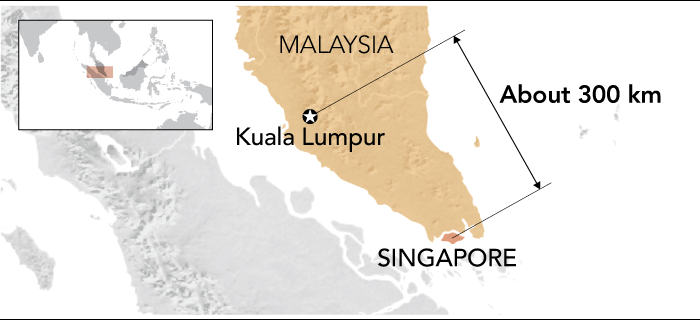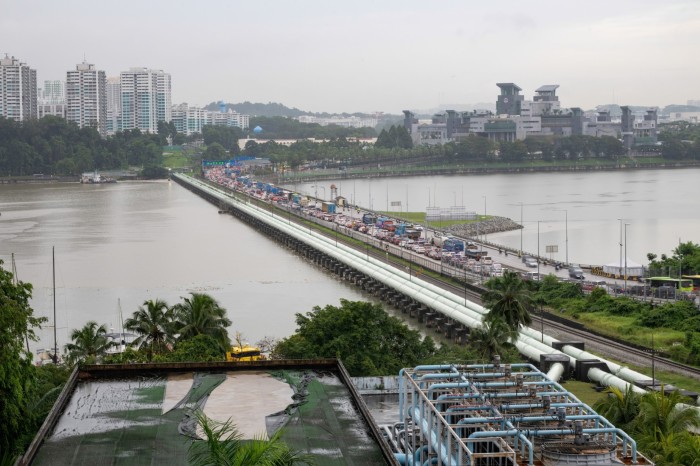
Unlock the Editor’s Digest for free
Roula Khalaf, Editor of the FT, selects her favourite stories in this weekly newsletter.
Malaysia is reviving a plan to build the country’s first high-speed railway connecting its capital of Kuala Lumpur to neighbouring Singapore after the two governments failed to reach an agreement on an earlier version of the project.
The first seven proposals submitted recently by the private sector include bids from consortiums led by state-owned China Railway Construction; South Korea’s Hyundai Rotem, a Hyundai Motor unit focused on railways and defence; and local conglomerates such as MMC, Gamuda, YTL, WCT Holdings and Berjaya, according to people familiar with the matter.
MyHSR, the government-owned entity leading the project, declined to name the companies interested in the project. Japanese companies did not submit proposals during the expression-of-interest process that ended on January 15.
MyHSR will shortlist three to four consortiums for the next phase, the request for proposals round, as early as this month and present its review of the bids to the cabinet, sources said. The Malaysian government is expected to present the proposal to Singapore over the next few months to determine if the city-state wants to take part in the project.
“We want to finalise [the proposal] as quickly as possible, hopefully over the next three to four months,” a Malaysian official told Nikkei Asia. MyHSR is also discussing an option to extend the line from Kuala Lumpur only to the southern state of Johor if Singapore decides not to participate.

This article is from Nikkei Asia, a global publication with a uniquely Asian perspective on politics, the economy, business and international affairs. Our own correspondents and outside commentators from around the world share their views on Asia, while our Asia300 section provides in-depth coverage of 300 of the biggest and fastest-growing listed companies from 11 economies outside Japan.
Subscribe | Group subscriptions
The expression-of-interest phase of the bidding follows Malaysia’s call in July last year for the private sector to submit proposals to develop and operate the project through a public-private partnership model.
In August, Singapore said it was willing to discuss any new proposal from Malaysia “starting from a clean state”, then-acting transport minister Chee Hong Tat told parliament. The city-state said at the time that it had not received any new proposals from its neighbour.
The revived plan comes as momentum grows for Malaysia to enhance its transport system and help make Johor a regional investment destination. The government signed a memorandum of understanding with Singapore in January to jointly develop a special economic zone in the southern state as a new engine of growth.
Sultan Ibrahim of Johor, who became Malaysia’s new king in January, said he wanted to revive the project. “I will make it [come back] on,” he told Singapore’s Straits Times in an interview published in December.
But Malaysian Prime Minister Anwar Ibrahim has said the government will not fund the project and is instead seeking privately backed proposals. Due to the country’s financial constraints, the government favours proposals with “comprehensive financing”, an official told Nikkei Asia.
During the initial review of the private-sector proposals, the Chinese consortium consisting of China Railway Construction, China Communications Construction and the Export-Import Bank of China, was seen as a strong candidate for the shortlist, given its financing scheme, sources said.

The high-speed railway project with Singapore was first floated in 2013 during former prime minister Najib Razak’s administration. The 350km link, which was agreed in 2016 and due to open in 2026, would have cut travel time between the two cities to about 90 minutes, versus more than four hours by car.
The high-speed rail line had been expected to boost cross-border business as well as development of areas along the line. The two neighbours have close economic ties, with the air route linking Singapore and Kuala Lumpur among the busiest in the world.
At the time, the project was estimated to cost about $17bn, and companies from China, Japan, South Korea and Europe had expressed interest in contracts to build, operate and finance the trains and rail assets.
But the project was hit by multiple delays due to escalating costs and changes in plans. The project was eventually scrapped in 2021, after Malaysia and Singapore failed to reach an agreement. Malaysia paid more than S$100mn (US$74mn) in compensation to Singapore for the termination.
The latest iteration of the project comes against a backdrop of new high speed rail lines in south-east Asia. In October, Indonesia officially opened the region’s first high-speed railway, connecting 140km between Jakarta and Bandung in less than an hour. The $7bn line was built by a consortium of Indonesian and Chinese state-owned companies, with government support for land acquisition.

But analysts said significant hurdles would need to be overcome if Malaysia were to complete the project. At an estimated cost of up to RM120bn ($25bn), funding is another obstacle for the government, which seeks to pay for the rail line with capital exclusively from private companies.
Adib Zalkapli, director at advisory BowerGroupAsia, said the project was “very ambitious” and would be “costly” for Malaysia to complete without clear government support, although the country’s tight fiscal position poses serious constraints.
To shore up the country’s fiscal position, Malaysia in October passed legislation to limit the country’s debt to 60 per cent of gross domestic product within three to five years. The country’s public debt as of December had reached RM1.5tn, or more than 80 per cent of GDP, well above this target.
Additional reporting by Dylan Loh
A version of this article was first published by Nikkei Asia on March 6. ©2024 Nikkei Inc. All rights reserved.

